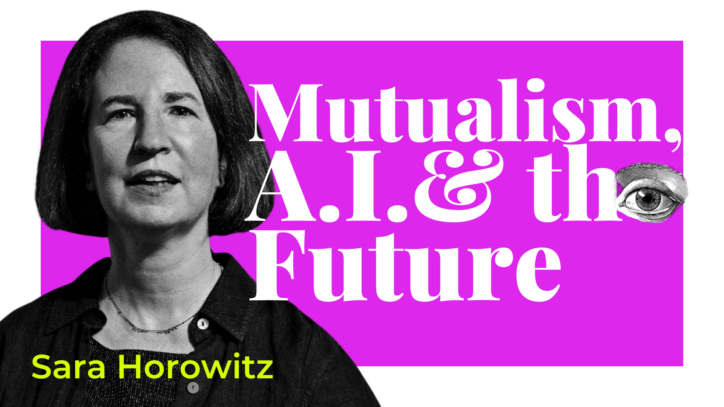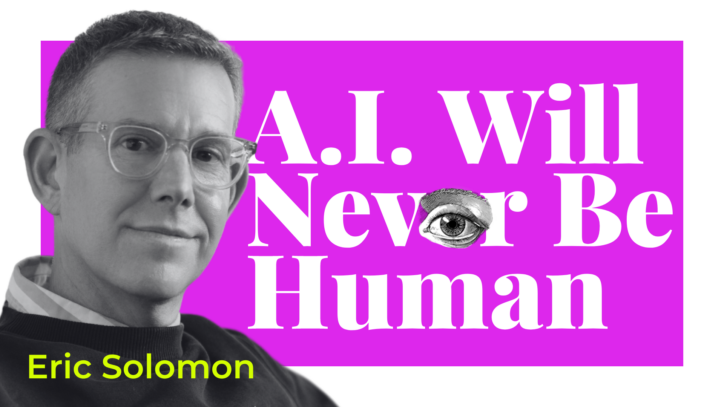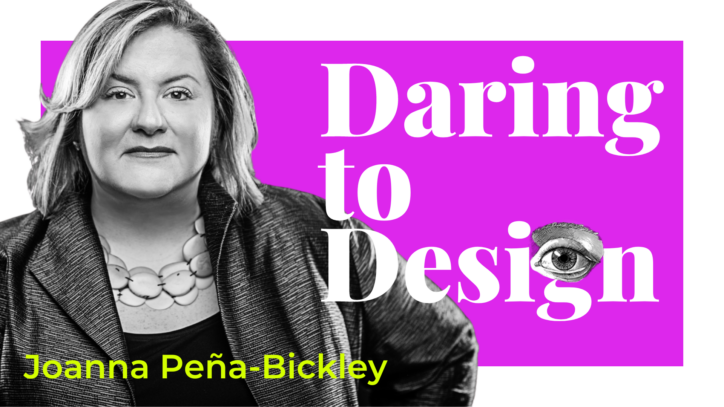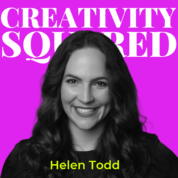
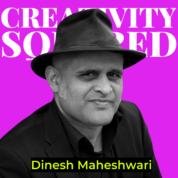
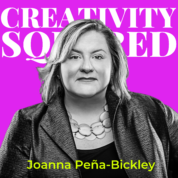
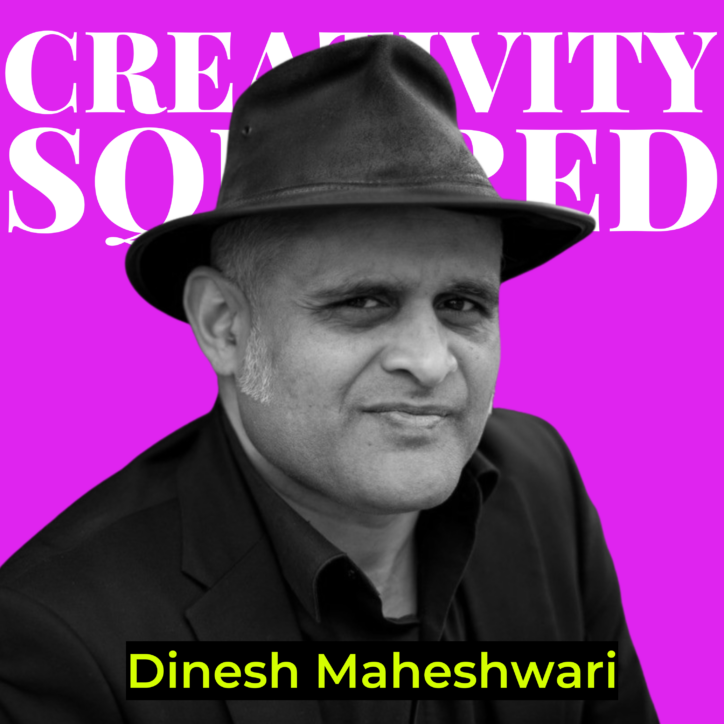
Ep67. A.I. & Human Flourishing: How Do We Get Back to Human Beings vs Humans Doing? A.I. Luminaries Dinesh Maheshwari and Guest Co-Host Joanna Peña-Bickley Weigh In
How do we get back to human beings and not just humans doing?
Today we have a special episode for you with two A.I. luminaries, guest Dinesh Maheshwari and guest co-host Joanna Peña-Bickley, who explore what it means to be human in the age of artificial intelligence.
This interview is the show’s first-ever live recorded episode brought to you in partnership with Joanna’s Ai Design Corps™! Dinesh zoomed in, and for our conversation in front of a live audience at the most recent Future Frequencies Salon. These quarterly salons are designed to inspire resilience with A.I. among the intimate group of participants at Joanna’s design lab, Aurora 21, against the backdrop of the beautiful Hudson Valley just outside of New York City.
Dinesh is a humanist entrepreneur, advisor to several startups, and Chief Technology Advisor at Groq. With a career spanning 9 startups, 3 of which he co-founded, Dinesh brings three decades of experience to the machine-learning space. He was part of the revolution in multi-threaded multi-processor high performance computing systems in the mid-‘80s; was at the forefront of the software revolution in electronic design automation from the late ‘80s to mid-‘90s; and was part of the revolution in optical communications and networking from the late ‘90s to early 2000s. He has served on the Board of Advisors for several startups and Board of Directors of industry organizations. He’s also been awarded 58 US patents with 23 additional patents pending.
Joanna, who was featured on Creativity Squared Episode 4, is the Founder & CEO of Vibes AI, an A.I.-first wearable company prioritizing brain vitality. She’s also the Founder of Ai Design Corps™, a non-profit on a mission to embed resilience into the future of learning and work with infinite diversity in infinite combinations through publishing open-source A.I. literacy resources and hosting webinars and bootcamps all over the world. Known as one of Alexa’s moms and the “Mother of Cognitive Experience Design,” Joanna integrates psychology, human-computer interaction (HCI), and design to enhance human cognition. For over 25 years, she’s launched visionary A.I. products for Amazon, AWS, Uber, GM, Citibank, and IBM, garnering patents and global acclaim featured in Time, Forbes, Fortune, TechCrunch, and The Wall Street Journal.
In today’s conversation, you’ll hear:
- Dinesh’s vision as a “humanist entrepreneur”.
- How Dinesh distinguishes between human and machine intelligence and the differences and importance of insight and intuition-based learning as compared to path-based learning.
- What A.I. inference is, and why it’s important.
- His perspective on the four levels of human existence, and we also explore the need for the humanities and the potential for meaningful human interactions in commercial spaces.
Discover Dinesh’s thoughts on how A.I. can unlock new value creation and free us from, in his own words, “productivity enslavement.” You won’t want to miss his and Joanna’s passionate belief in embracing our human potential in the age of A.I.!
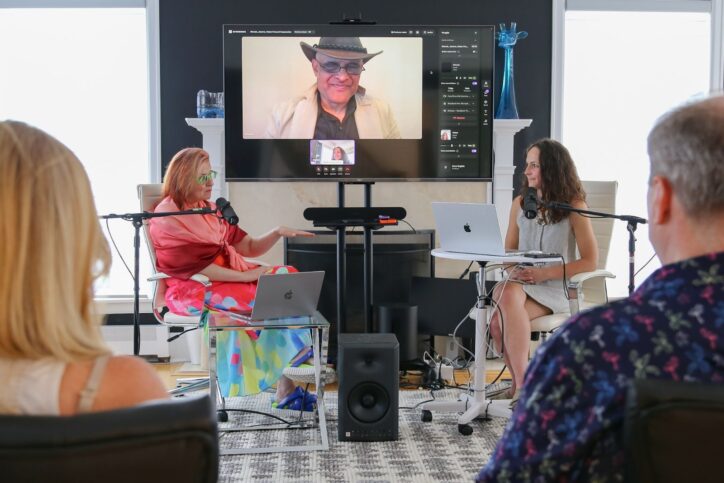
Humanist Entrepreneur in the World of Machine Intelligence
Dinesh’s approach to entrepreneurship is deeply rooted in his humanist principles. He seeks to work on projects that empower individuals, enabling them to shape market spaces and governing bodies, rather than being controlled by them. His focus isn’t on any particular field of technology or product, but rather on enabling value for society as a whole.
This philosophy has guided his work across various fields, from high-performance computing to education systems.
“I like to work with startups that enable value, societal value for commercially viable solutions that can be deployed at large scope and large scale, so that it doesn’t leave any human behind.”
Dinesh Maheshwari
This humanist approach extends to his view of education and individual empowerment. Dinesh emphasizes the importance of evolving education systems and distributing technology in ways that empower individuals. He believes that this empowerment is fundamental to creating the right governing bodies and market spaces, rather than allowing these structures to control individuals.

Intuition: The Secret Ingredient of Human Intelligence
One of the most striking aspects of Dinesh’s perspective is his clear distinction between human and machine intelligence. While artificial intelligence, particularly in the form of large language models, has made impressive strides, Dinesh argues that it fundamentally differs from human cognition in a crucial way.
“Artificial general intelligence can beat human beings’ intelligence only if we reduce human intelligence to that of the machines. And the reason for that, I believe, is fundamentally how human learning is different from machine learning as being practiced today.”
Dinesh Maheshwari
Human learning, according to Dinesh, can be categorized into two types: path-based (or associative) learning and insight-based (or intuitive) learning. Current machine learning techniques excel at path-based learning, which involves analyzing patterns and making associations. However, they fall short when it comes to insight-based learning – the kind of instantaneous, breakthrough thinking that has led to humanity’s greatest discoveries.
Dinesh illustrates this point by referencing historical figures like Archimedes, Darwin, and Einstein, whose insights expanded our understanding of the world in ways that couldn’t be achieved through incremental, path-based learning alone. This unique human capability, Dinesh argues, is what truly sets us apart from machines and what we should strive to nurture and develop.
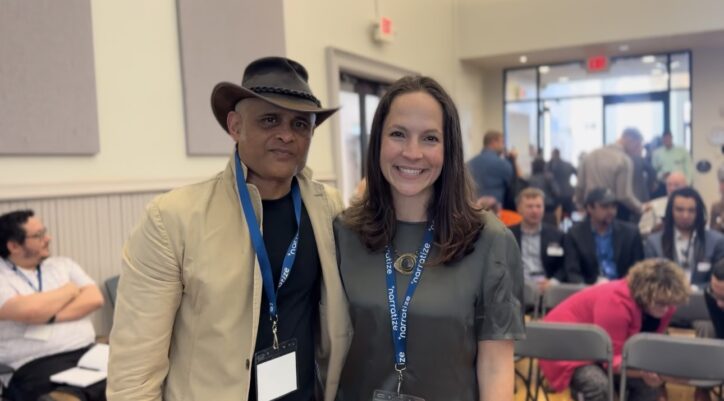
Four Levels of Human Existence
To further explore what it means to be human, Dinesh outlines four levels of human existence:
- Sensory Level: This is the most basic level, where we simply react to sensory inputs without deeper consideration.
- Existential Level: At this level, we consider our essential needs and act in ways that ensure our survival and well-being.
- Doing Level: This is where most of our current societal interactions occur. We engage in commerce, establish our value to others, and focus on productivity and achievement.
- Being Level: The highest level, where we truly connect with ourselves and others, thinking and feeling deeply and meaningfully.
Dinesh argues that while our society primarily operates at the “doing” level, true fulfillment comes from the “being” level. The challenge lies in creating structures that allow us to spend more time in this state of meaningful existence.
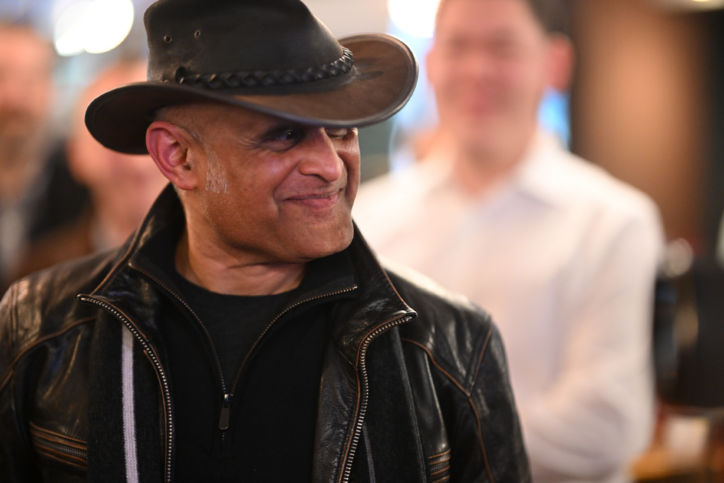
Challenges of Inference in A.I.
While much emphasis has been placed on training A.I. models, Dinesh argues that inference – the use of trained models to perform tasks or answer queries – is where the real challenge and potential lie.
“Inference is not only the bigger compute problem…it is a more difficult problem to solve,” Dinesh explains. He points out that inference needs to be done at the lowest cost possible, with the lowest power consumption, and at the lowest latency. These constraints make inference a particularly challenging aspect of A.I. development.

Opportunities for Improving Quality of Life
Dinesh sees artificial intelligence as a powerful tool that could potentially free us from what he terms “productivity enslavement” – a state where we’re constantly driven to do more, often at the cost of our well-being and meaningful human connections. This is illustrated with an anecdote about washing machines: while they were supposed to free up time for leisure, they instead led to higher expectations of cleanliness and, ultimately, more work.
“This transition to machine learning is another opportunity wherein we enable focus on improving the quality of life and not just improving productivity, as we have done in the past transitions.”
Dinesh Maheshwari
However, Dinesh envisions a future where A.I. takes on more of the mundane workload, allowing us to invest more time in enjoyable, meaningful interactions. This shift could transform our daily experiences, making them more fulfilling and truly human.
Joanna Pena-Bickley adds to this perspective, highlighting a shift in economic thinking from “the age of progress to the age of resilience.” She emphasizes the need to move from valuing efficiency to adaptivity, from productivity to regenerativity, and from growth at all costs to flourishing.
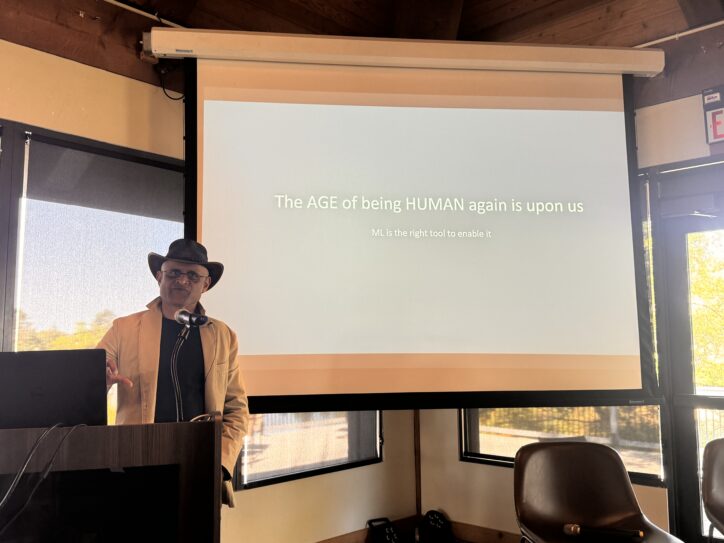
Importance of Humanities and Meaningful Human Interactions
One area where Dinesh sees significant potential for improvement is in our commercial interactions. He points out that most of our time is spent in commercial spaces where human interactions are highly regimented and often devoid of meaningful connection. He uses the example of getting a manicure or pedicure – while the service itself might be high-quality, the human interaction is often secondary and limited.
Dinesh argues for the importance of structuring commercial enterprises in a way that values quality human interactions. He suggests that this shift could allow us to feel more alive and human in our day-to-day lives, rather than limiting meaningful interactions to a few hours with friends and family on weekends.
One of the keys to making this pivot toward more fulfilling interactions is making sure that we are focusing on the correct problems. Dinesh says that’s where the humanities come in. Disciplines like sociology, psychology, and liberal arts produce the narratives that identify the problems that are most pressing for our quality of human life. Once the problems are identified, they can be quantified in terms of math and science, so technology solutions can be developed.
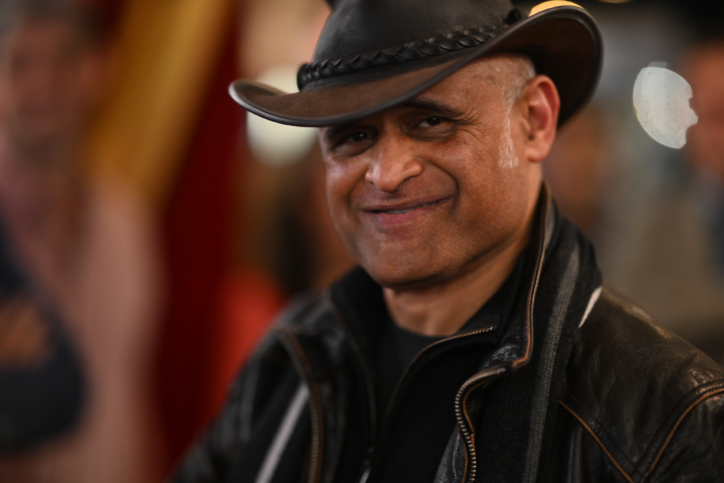
Freeing Ourselves from “Productivity Enslavement”
Dinesh advocates for using machine learning tools to improve how we do things, allowing us to reclaim our time for more meaningful pursuits. He sees this as an opportunity to deliver us from the productivity enslavement that dominates our society.
“Emphasis on education, wherein every individual is exposed to what we call liberal arts, I believe, is required going forward for us human beings to not fall in that trap that, unfortunately, we have been in the past few centuries of optimizing largely in one dimension, that is productivity, that has improved a quality of existence, but not necessarily quality of life.”
Dinesh Maheshwari
This perspective aligns with Joanna’s point about moving from consumerism to eco-stewardship, and from measuring success solely by GDP to considering quality of life indicators. As Joanna puts it, “We tend to measure what we value,” suggesting that a shift in what we measure could lead to a shift in what we prioritize as a society.

Embracing Human Potential
Both Dinesh and Joanna share a passionate belief in embracing our human potential. Dinesh emphasizes that while machine learning is a powerful tool, it “doesn’t come anywhere close to what human potential is.” He encourages us to see this moment as an opportunity to “be human beings again,” using A.I. tools to free ourselves from productivity-focused constraints and explore the full range of human experience and capability.
Joanna echoes this sentiment, framing it as a move from “the idea of efficiency to adaptivity, productivity to regenerativity.” She sees this shift as part of a larger transformation, not just in technology but in our economic underpinnings and societal values.
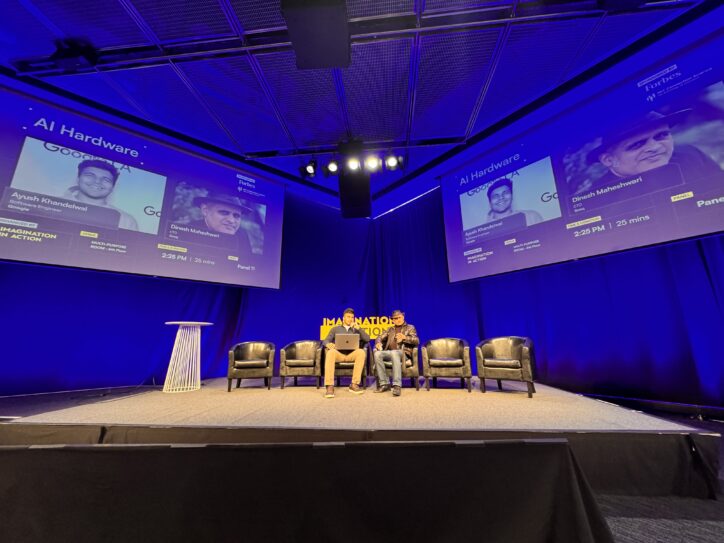
Conclusion
As we navigate this era of rapid technological advancement, Dinesh’s and Joanna’s insights offer a compelling vision for our future. They remind us that while machine learning is a powerful tool, it doesn’t come close to the full potential of human capabilities. The challenge – and the opportunity – lies in using these tools to free ourselves from productivity enslavement and rediscover what it truly means to be human.
“It is the time for us to be human beings again that is upon us, where we can use the machine learning tools to make it happen.”
Dinesh Maheshwari
As we move forward, let’s embrace this opportunity to redefine progress, prioritize meaningful connections, and create a world that values being as much as doing.
Joanna adds a final thought, encouraging us to move “from the idea of growth, growth, growth at all cost, to flourishing.” This shift in perspective invites us to consider not just individual empowerment, but also how we can flourish in community with others.
As we stand at a pivotal moment in human history, we have the chance to shape a future that honors the full spectrum of human experience. By leveraging the power of A.I. while staying true to our uniquely human qualities of insight, creativity, and meaningful connection, we may just unlock the full potential of both our technological innovations and our shared humanity.
Links Mentioned in this Podcast
- AI Design Corps™
- Future Frequencies Salon All-Female Panel on A.I. – Transcript
- Aurora 21
- Groq
- Podcast: Episode 4 – Joanna Peña-Bickley: Daring to Design a Better Future
- Vibes AI
Continue the Conversation
Thank you, Dinesh and Joanna, for joining us on this special episode of Creativity Squared.
This show is produced and made possible by the team at PLAY Audio Agency: https://playaudioagency.com.
Creativity Squared is brought to you by Sociality Squared, a social media agency who understands the magic of bringing people together around what they value and love: https://socialitysquared.com.
Because it’s important to support artists, 10% of all revenue Creativity Squared generates will go to ArtsWave, a nationally recognized non-profit that supports over 150 arts organizations, projects, and independent artists.
Join Creativity Squared’s free weekly newsletter and become a premium supporter here.
TRANSCRIPT
[00:00:00] Dinesh: For the past few centuries, we as human beings have focused on improving productivity and specifically improving productivity for products and services that are essential for existence. And we have become better and better at that, which has improved the quality of existence significantly. And I would posit that it has improved the quality of existence, but not necessarily the quality of life.
[00:00:27] Helen: How do we get back to human beings, and not just humans doing? Today, we have a special episode for you with two AI luminaries, guest Dinesh Maheshwari and guest co-host Joanna Peña Bickley, who explore what it means to be human in the age of artificial intelligence, this interview is the show’s first ever live recorded episode brought to you in partnership with Joanna’s AI Design Corps.
[00:01:00] Helen: Dinesh zoomed in and we recorded the conversation in front of a live audience at the most recent Future Frequencies Salon. These quarterly salons are designed to inspire resilience with AI, among the intimate group of participants at Joanna’s design lab, Aurora 21 against the backdrop of the beautiful Hudson Valley, just outside of New York City.
[00:01:24] Helen: Dinesh is a humanist entrepreneur, advisor to several startups and chief technology advisor at Grok. With a career across nine startups, three of which he co founded, Dinesh brings three decades of experience to the machine learning space. He was part of the revolution in multi threaded, multi processor HPC systems in the mid eighties, was at the forefront of the EDA software revolution from the late 80s to mid nineties and was part of the revolution in optical communications and networking from the late nineties to early two thousands.
[00:02:02] Helen: He has also served on the board of advisors of several startups and board of directors of industry organizations and has been awarded 58 US patents with 23 additional patents pending. Joanna, who was featured on Creativity Squared episode four, is the founder and CEO of Vibes AI, an AI first wearable company, prioritizing brain vitality. She’s also the founder of AI Design Corp, a nonprofit on a mission to embed resilience into the future of learning and work with infinite diversity and infinite combinations through publishing open source AI literacy resources and hosting webinars and bootcamps all over the world.
[00:02:48] Helen: Known as one of Alexa’s moms and the mother of cognitive experience design, Joanna integrates psychology, human computer interaction, and design to enhance human cognition. For over 25 years, she’s launched visionary AI products for Amazon, AWS, Uber, GM, Citibank, and IBM, garnering patents and global acclaim featured in Time, Forbes, Fortune, Tech Crunch, the Wall Street Journal, and more.
[00:03:22] Helen: In today’s conversation, you’ll hear Dinesh’s vision as a humanist entrepreneur and his innovative new compute paradigm for machine learning. You’ll also learn how Dinesh distinguishes between human and machine intelligence and the differences in importance of insight and intuition based learning as compared to path based learning.
[00:03:48] Helen: He also shares his perspective on the four levels of human existence. And we also explore the need for the humanities and the potential for meaningful human interactions in commercial spaces. Discover Dinesh’s thoughts on how AI can unlock new value creation and free us from, in his own words, productivity enslavement.
[00:04:14] Helen: You won’t want to miss his and Joanna’s passionate belief in embracing our human potential in the age of AI. Enjoy.
[00:04:31] Helen: Welcome to Creativity Squared. Discover how creatives are collaborating with artificial intelligence in your inbox, on YouTube, and on your preferred podcast platform. Hi, I’m Helen Todd, your host, and I’m so excited to have you join the weekly conversations I’m having with amazing pioneers in this space.
[00:04:49] Helen: The intention of these conversations is to ignite our collective imagination at the intersection of AI and creativity to envision a world where artists thrive.
[00:05:06] Helen: Welcome to Creativity Squared. We have a very special episode for you today. It’s the first ever live recording of the show. So we have the live audience.
[00:05:20] Helen: I have the first ever co host, Joanna Peña Bickley.
[00:05:24] Joanna: Hey, how is everybody?
[00:05:28] Helen: And we have a very special guest who’s zooming in and is on a TV for those who are just listening for the audio version, and it is Dinesh Mahaweshwari.
[00:05:42] Dinesh: Helen, thanks for inviting me to this conversation.
[00:05:46] Helen: So we are in the beautiful Hudson Valley at Joanna Peña Bickley’s Aurora 21 lab for the Future Frequency Salon. And Joanna, I thought I’d let you introduce where we are today and why it’s so special.
[00:06:00] Joanna: Absolutely. Well, thank you, first of all, for actually inviting me to be your co-host and doing this remarkable session.
[00:06:07] Joanna: You know, we established Future Frequencies was actually to tune in to the future of artificial intelligence. You know, as the CEO of an AI company and as the mother of cognitive experience design, what I realized was I had spent all of my time, in very small rooms, dark rooms in front of a computer screen.
[00:06:28] Joanna: And at the turn of events, you know, I think when we kind of feel that moment, almost a Turing test moment, if we’ll say, of feeling that the technology had become indistinguishable from magic and it caught the zeitgeist. What I realized was I needed to get out of my lab for a little bit and out of my comfort zone and begin speaking with women in a way that made AI feel more accessible because the future isn’t just going to be held by you know, a very focused group of people.
[00:07:03] Joanna: It needs to be held by everybody. And so if we’re going to bring everybody along, what I had realized was that the conversation that we in the industry were having was either best thing since sliced bread, worst thing since Oppenheimer, right? It creates nuclear war. And so if we think about it from that perspective, said, how do we bring community together to talk about the future that we want, right?
[00:07:26] Joanna: Where AI can play a role in being more than just a tool. I think, you know, I fundamentally believe that it is more than just a tool, and that it’s impact, right? We’re just beginning to feel the impact of it. But, putting Future Frequencies together was actually to bring those of us who had been in the labs, people like Dinesh, people like myself, right?
[00:07:52] Joanna: At well established places, we got [the] chance, Dinesh and I actually were on a stage at MIT together, and I realized, which was, well, guess what? All the kids at MIT know what AI is. We need to actually bring it back to our communities and come to places that we haven’t necessarily always been.
[00:08:10] Joanna: And so that was the impetus behind doing Future Frequency Salons is in order to truly get to the bottom of learning, not just an education of what AI is, but how you can contribute to it so that you become the super intelligence in the world.
[00:08:28] Helen: Thank you. And for those who don’t know who Joanna is, she was actually the fourth guest on my show. So she’s a very dear friend and helped kick off Creativity Squared. And she has an amazing AI first company Vibes AI. And she has, you know, an impressive resume with a few things like, you know, helping invent Alexa on it as well. So very honored to have Joanna co-host.
[00:08:52] Helen: Okay. And Dinesh who’s with us today, a very special guest too, that we’re super honored to have. He’s a humanist entrepreneur, advisor to several startups and chief technology advisor to Grok. So Dinesh, I’d like for you to kick off and introduce yourself, what you do, and a little bit about your origin story.
[00:09:12] Dinesh: I’ll describe myself as my friends would, a humanist entrepreneur. I like to work with startups that enable value, societal value for commercially viable solutions that can be deployed at large scope and at large scale, so that, it doesn’t leave any human behind. I’ve been doing this now for, many decades.
[00:09:38] Dinesh: Grok is my turnstile, and nine of them before that, three of them my own, of which, six of them were significantly successful that enabled deep technologies that had enabled significantly more than as we see in the society today. I would like to keep enabling that, working with, other startups as well.
[00:10:03] Dinesh: While I’m Chief Technology Advisor at Grok, I am on the Board of Advisors of several other startups, non-competing Grok, of course, and non-competing amongst themselves. These startups range from semiconductor materials to machine learning, applied applications, healthcare, education, energy. The field of the technology and the product does not matter to me as long as it enables value for the society.
[00:10:35] Dinesh: I am not afraid of jumping into a new field if there’s a promise for enabling significant value. And in that context, I have worked in high performance computing in the days of large supercomputers, and to complete problems to solve the modeling of large spaces and enable software that enables the automation of chips as we see it without the, chips that we do today would not be possible.
[00:11:07] Dinesh: Long haul optical communications, data networking, solar power, nuclear fusion, gasoline from agricultural waste, RF, complete architectures, long haul memory architectures, and what I’ve also been looking at, online, is to evolve our education system; disseminate technology and so on and so forth that would empower the individual.
[00:11:35] Dinesh: It’s fundamentally about, as I see it, empowering the individual so that the individual can then enable the right governing bodies and the market spaces so that the market spaces and the governing bodies are not the one controlling the individual. It is the other way around, where the set of individuals enable the right governing structures and market places.
[00:12:05] Dinesh: And of course, education systems are a big part of that to empower the individual.
[00:12:10] Helen: Thank you so much for that introduction, Dinesh. We really haven’t talked about hardware or chips that much on the show. It’s only come up on one or two episodes and I just want to spend just a few minutes on it from the seat that you sit in.
[00:12:24] Helen: Could you give us a quick landscape of where the chip and hardware is right now? And also, what Grok is for those who might not be familiar.
[00:12:32] Dinesh: We can think about Grok and what it is enabling, is [a] new complete paradigm that applies very well to machine learning and specifically to large language models to a product that we call LPUs, Language Processing Unit.
[00:12:52] Dinesh: The upviews are based on a new compute paradigm, different from the, all the existing compute chips. The way to think about the existing compute chips is that they are based on a paradigm under the umbrella of one non-compute paradigm, which is, in a sense, similar to how the cars were being manufactured before Ford enabled the dynamic assembly line and in those days before a dynamic assembly line, you would have a manager in a room with about 9 to 10 experts, each of them working on different part of the car and each of the experts would then go to the warehouse to get the appropriate parts needed to work on the sedan or the transmission.
[00:13:40] Dinesh: In fact, you may have multiple rooms, each room working on one car at a time. That is how a core in a CPU or GPU works. We have a centralized instruction queue that instructs the functional units, the experts in the car manufacturing, that with a centralized list of files where the local data is fetched from, and the data is then, and the compute, and the data in which the computation is being done, and the compute program itself, is fetched from DRAM warehouse.
[00:14:22] Dinesh: So you can see that this model is more like a hub and spoke design. Each core is operating that way, and then multiple cores go to the DRAM to access the compute program and the compute data. There’s another centralization that is happening. Both of them are choke points. And you can imagine that when you have to compute in large amounts of data that, have to undergo transformations specifically like linear or variable transformations, which is the foundation of machine learning and also high performance computing.
[00:15:05] Dinesh: Such choke points create inefficiencies in throughput per dollar, throughput per watt. And the current compute paradigm, while it is general purpose, does not really enable the performance that is needed. The underlying compute paradigm for Grok is best described as a programmable dynamic assembly line architecture, where in there are no centralized instruction kits or register flags.
[00:15:41] Dinesh: And as such, the computation is done as the data streams across the various compute units on the conveyor belts, running over the function gaps. Whatever it needs to operate on, from the conveyor belt, that it is told to grab it, operates on it, puts it back on the right conveyor belt, it doesn’t know where the inputs are coming from, it doesn’t know who’s going to use the output.
[00:16:11] Dinesh: There is no need for simplification. And the data is fresh from extremely high bandwidth. Extra, and also the intermediate output can go back to the warehouse as well. And this enables compute throughput per dollar and throughput per watt, that is orders of magnitude better than what the purpose built designs do.
[00:16:39] Dinesh: Very much like how the assembly lines revolutionize the manufacturing with high throughput per dollar and high throughput per watt. Similarly, this architecture does the same in the compute side. It also enables, i importantly, low latency. And for machine learning to be adopted by human beings and for it to be interactive for human usage, low latency is what makes it human.
[00:17:10] Dinesh: And that is what Grok enables. In the current times, semiconductor chips, specifically the one that enabled a high performance compute needed for machine learning, such as to compute large language models, such chips are as important, perhaps more so than steel was for the era when steel revolutionized the world.
[00:17:44] Dinesh: Yesterday we take, I think, type of steel for granted, but, when it was first introduced, it enabled a big step function. Another analogy is a transition from cars and buggy to the automotives that changed society as we see it in production of products and the distribution of products. As is semiconductor now is such an industry and today this industry is, it’s fairly demanded, it does require significant research. It does require significant capits.
[00:18:35] Dinesh: This requires significant manufacturing prowess. And the manufacturing is being led by a handful of entities around the world. You all know them, TSMC, Samsung, Intel, Global Foundries. The design of such chips is, also requires significant talent. That’s described as information, the higher of the information, worker talent.
[00:19:11] Dinesh: Above the design layer, the current chips require significant thought in how they are architected, and how they are thought through to solve the difficult problems that need to be addressed. And that is in the space that’s described, mathematically, and that’s confirmed mathematically to be good, complete, and relevant to what needs to be done.
[00:19:43] Dinesh: That space itself is at a level that, a practice at a level that is in the top three percentiles of what needs to be done. This should reflect that the chip industry, the semiconductor industry, as it is running machine learning semiconductors,
[00:20:07] Dinesh: requires the talent pool, access to talent pool, not just capits. That is not easy to get to. Again, few centers in the world that one can see as the hubs for such talent. Silicon Valley is one such, And a few of those like this, will work.
[00:20:32] Helen: Thank you for that great overview.
[00:20:34] Joanna: So I think one of the things is that, you know, that Dinesh, you kind of outlined, right, is what we talked yesterday a little bit about, right, for listeners that were here at Future Frequencies.
[00:20:46] Joanna: Part of that piece that I think is important in AI, right, we have a kind of three layer cake that has happened. And compute is at that fundamental, right? So are the chips. And I actually think so much of what Dinesh is talking about with regards to inference, and Dinesh, you know, I think the question that I’ll have for you in a second as we move through the three layers of the cake, we’ll come back to, but, you know, that inference is actually what’s going to help things like foundational models should become stronger and quicker, but I think that there’s actually something even more fundamental to it than the top of the layer cake, is the application layer.
[00:21:25] Joanna: So if we’re thinking about it in this standpoint of, a tool that we all use today, which is Chat GPT, we’re using the application layer. It calls, right, the foundational layer, and has to have significant compute to infer. The reason that it is so easy to use these days, right, is that we don’t ask machines direct questions.
[00:21:47] Joanna: We often, the machine has to infer to understand what it is that you said, and then to bring back what feels like a human response. And, one of the questions that I have for you, Dinesh, is in the world of inference, can you give us, because, you know, I will say that most of our listeners, you know, that, that’s a deep concept that I’ve often had to explain to people.
[00:22:13] Joanna: but I would love to get your explanation and really diving deep into not just what is inference, but why is inference important in the compute layer, and what is its impact, through each layer of that layer cake?
[00:22:27] Dinesh: Great question, Joanna. While the emphasis over the past decade and a half has been on training and coming up with the models, that have culminated in the large language models; once the models have been trained, the use of the model for the purpose of answering queries for the people that are doing a specific task is what we call inference.
[00:23:03] Dinesh: This is akin to a human being going through, the early years of schooling, perhaps an undergrad degree, perhaps a grad, a master’s degree after that, and a specialization, in the form of PhD. And one can call all of that training where the human being has learned specific things that can be then commercially deployed as in their services that they provide.
[00:23:37] Dinesh: The human being then, in line of deploying the services operates on problems to come up with the right solutions, the right way using the training, and that one can call as inference. The human being looking at the problem, going by their training, coming up with the right solution and inferring as to what the right solution would be.
[00:24:07] Dinesh: Training and inference for machine learning is very much like that as well. Now as you can see, a human being gets trained once, but over their lifetime, they deploy their services a lot more often for on average a longer period of time than the time that they were trained for. For machine learning models, that ratio is even larger.
[00:24:32] Dinesh: The compute requirement for training gets dwarfed by many orders of magnitude by the compute requirement that would be for inference, because once the model has been trained, the volume of inference on such model is significantly large. Inference, as such, is the more impactful problem to solve.
[00:24:58] Dinesh: Inference, as such, is also more constrained, where the inference has to be done at the lowest cost possible, at the lowest power possible and at the lowest latency in many certain factions. In France, it requires bigger, larger amount of compute. It is a more difficult problem to solve. That is what going forward, we are going to see the emphasis on.
[00:25:25] Dinesh: And one more important aspect, while there is a distinct delineation today between training and inference, we must watch human beings. Well, the human beings, quote unquote, go through education, training, school, college, grad school, post doctorate. As they deploy their services in the non-inference, it’s not as if they stop learning.
[00:25:55] Dinesh: Every non-inference is an opportunity for learning more. Similarly, going forward, we will see continuous training or real time training and tuning that would happen as the inference is done as well. Five years from now, perhaps it will take 10 years. Looking back, we will not likely see the start delineation right now that is projected between inference and training.
[00:26:30] Dinesh: And inference is, by large, a more difficult problem to solve.
[00:26:35] Helen: One question, because what you just described is kind of how the inference is similar to how the human mind works, but in so many ways, even though we compare the machines to humans, they will never have, and maybe that’s a controversial statement, the human intuition and insight.
[00:26:56] Helen: And I was wondering if you could speak to that in your perspective on, really where we are uniquely human compared to a lot of the conversations right now around AI.
[00:27:06] Dinesh: Machine learning as practiced today does, bring forth arguments for, quote unquote, artificial intelligence, artificial general intelligence, and the best way I would describe this to my friends is artificial general intelligence can be human or can beat human beings intelligence only if we reduce human intelligence to that of the machines.
[00:27:45] Dinesh: And the reason for that, I believe, is fundamentally how human learning is different from machine learning as being practiced today. Human learning can be abstracted to what the geal theists put forth as in the early 19 hundreds as the part based analysis based or associated learning on one side, and insight or intuition based learning on the other side.
[00:28:18] Dinesh: Unfortunately that categorization did not take much value and was the subgroup by World War I and World War II. And most of the emphasis has been on part based learning, that can be modeled by Maxwell Boltzmann statistics and distribution and the underlying math, and is manifested in techniques like simulated reading and Stochastic Gradient Descent, which is a close cousin of Simulated Animating, and the Stochastic Gradient Descent that is at the heart of Machine Learning. All optimization problems can be reduced to this class of techniques, Simulated Animating, Stochastic Gradient Animating, Stochastic Gradient Descent, so on and so forth.
[00:29:10] Dinesh: Insight or intuition based learning, while it has been observed under fMRI, functional magnetic resonance imaging, similar to how path based learning has been observed under fMRI, is very different and distinct in that it happens immediately. One can observe the beginning state and the end state, but the intermediate state, insight and intuition, has not been observed distinctly.
[00:29:42] Dinesh: It happens instantaneously, at what would appear instantaneously. Such a learning approach can be modeled by both Einstein and distribution statistics and the maths related to it, which can be manifesting techniques by quantum memory. And I’m saying model because it’s not a statement that is what happens in the brain.
[00:30:16] Dinesh: Inside intution based learning is what has been responsible for the big breakthroughs that have been made by the human kind that expand the space of our understanding. In this category, one can think of the breakthrough that were made by individuals like Archimedes, Darwin, Einstein, Leonardo, where they enabled new dimensional spaces with, one could envision new problem surfaces for the gauge manifolds and solution manifolds that could be stated in something as simple as E equals mc squared.
[00:31:10] Dinesh: So how does this particular equation, which reflects, a viable surface or manifold has only three variables, but other ones have more variables, but insights usually result into such breakthroughs that are very simple by nature. Syntheticity to me is, not the number of variables involved, but the exceptions in describing the problem or the solution.
[00:31:41] Dinesh: The more the exceptions, the more complex it is. Insight and intuition based learning has resulted into enabling new understanding of the kind that Einstein enabled with special relativity and so on and so forth; that Darwin enabled with his theory of evolution. That is what pushes the, or the human understanding of the world around us.
[00:32:12] Dinesh: From the little we know, and by physics we know that you only know 5 percent of what there is to know, the rest is dark energy, dark matter, or else what we know has an error bar of 2000%. It is the insight and intuition based learning that pushes the boundary of what we know and enables us to understand what’s still in the unknown.
[00:32:36] Dinesh: Machines today, all the techniques today being deployed, fall under the category of part based learning. And as such, cannot do what is required for a certain intuition that, would require something similar to quantum maneuver that can be done over a very large number of variables. As such, I do not see a kind of machine learning approaches coming close to what human beings are capable of doing, even though we have emphasized on birthdays, learning for the past few centuries explicitly, we have the potential to exercise an insight and intuition that cannot be replicated by machine.
[00:33:18] Dinesh: That is something that makes us human, uniquely human, and that is something we can, and we’ll have the time to hone, evolve, and practice as we use the machines to do the part based tasks that currently has required human beings to do in the name of productivity improvement and as such reducing human beings to productivity slaves.
[00:33:50] Dinesh: It is this unique capability of human beings on a certain intuition side is what I believe enables the quality of living, it is what makes us human and machine learning would enable us to finally start being human again, maybe just use machine learning for us to, enable more time for us.
[00:34:18] Helen: Oh, one person in our live audience today is I’m going to do a shout out to, Lori Mazur, who was also at the MIT AI summit, in the audience with me, while you and Joanna were on stage, she’s also has been a guest on Creativity Squared.
[00:34:34] Helen: And I know before in one of our earlier conversations, I shared, that she shared, that she thinks that machines can be as creative as humans, and [that] it’s just an advanced math problem. And Dinesh actually said, he wants to have a conversation with Lori. So that’s for another show. But I know, Joanna, you had a question specifically for Dinesh, as a humanist and what it means to be human in this age of AI, so I’ll let you [take over].
[00:35:00] Joanna: Well, one of the things that I admire the most about Dinesh’s work is that he is a humanist. And for those of us in the field of engineering, we sometimes forget about the humans. And so to be a human centered engineer and to be someone who truly takes from the humanist part, I think so often when we think about these three layers of the world that we live in, and we think about the artificial, general intelligence, and of course, then there’s super intelligence, which, most of our audience, you know, that are listening today, if you don’t know that maybe the progression of where we are today, narrow AI, much of us are working from narrow AI into general, right?
[00:35:44] Joanna: Artificial intelligence from there into super intelligence. I would love to hear your perspective on a few things. I think that the first one is, what does it mean, truly, right, to be a humanist amidst such technological advancing times, is really kind of the first part of the question for me.
[00:36:06] Dinesh: Joanna, again, a great question.
[00:36:09] Dinesh: During these transition times, when we have access to new, quote unquote, technology tools, and within the commercial paradigm that is largely practiced around the world, that we call capitalism, which is the best, commercial, best paradigm for commerce that we know as human beings. One can use the new tools to solve the old problems in less amount of time or less cost as such improving the cost structure for the solutions and the existing commercial practices would drive, would incentivize in the immediate short term such use of such tools.
[00:37:07] Dinesh: This usage, however, only does not solve any new problems that enable value for human solid living. It improves the cost structure that at best makes the product more accessible to every individual, but likely improves the profit margins for the entities that are offering such products. Being humanist during such a transition is about also looking at what the new tools can be used to solve problems that have been plaguing the human society for some time that have not been solved that would enable new value that would uplift human beings across the globe and as such, enable better quality of life for everyone.
[00:38:07] Dinesh: Now, this can include being able to come up with new materials that can solve new problems, new methods and approaches for, say, a lower cost desalination, low cost fertilizer manufacturing, better approaches for education, better approaches for medical services. This does require a thoughtful understanding of what problems [are] relevant and add societal value while they are commercially viable.
[00:38:48] Dinesh: And this understanding, as I see, comes from important disciplines of sociology, anthropology, economics, philosophy, wherein one can see how certain problems when solved would enable societal value while being commercially viable. And such a problem can then be specified in the language of math, physics, and biology, chemistry included.
[00:39:18] Dinesh: Solutions again described in the language of math, physics, biology, chemistry included. And it is after the problem and solutions have been thus stated, can then one engineer it to enable it as a product or a service. This is a way of thinking, being a humanist entrepreneur, a humanist technologist, therefore is a way of thinking of what enables societal value, that’s commercially viable, how it should be approached to manifest it in a tangible fashion, while it is still not just commercially viable, but it is commercially competitive as an initiative.
[00:39:59] Dinesh: It does require more than a blind pursuit of engineering towards solving the existing problems that have been solved, but just solving them for lower costs and lower time. This does require the education institutions to look at enabling, understanding, or solving such problems and in this way, as I described.
[00:40:28] Helen: And you’ve mentioned before that there’s a difference between human doing and human beings, and that we need to get back to the human being.
[00:40:38] Helen: And there’s actually like four different levels of abstraction that we operate in. And I was wondering if you could speak to that for our live audience and our viewers and listeners as well.
[00:40:47] Dinesh: A great topic again, having something that I find important for me to talk about. I am abstract human interaction and ways of existence and living into four levels.
[00:41:01] Dinesh: The base layer being sensory, where one is reacting to the sensory input, and the money to the sensory input without regard to anything else. The layer above that. I call it, the Existential Layer, where one takes into account the aspects that are essential to serve existential needs and does not react to sensory inputs in a fashion that would threaten the existence of the entity, in this case or individuals in the species homo sapiens.
[00:41:40] Dinesh: The layer about that, I see as what is enabled in the current societies, where the human being engages in, interactions and commerce with individuals, whether that is intellectual interaction, or economic transaction where the individual is establishing a certain value to the other individual that they are attracting.
[00:42:15] Dinesh: And in such a scenario, the individual is doing something. This doing is easy to see in the context of the commercial products that are used to drive the commercial system that you call capitalism, that serves the livelihood of the individuals. However, it is used for more than that. It is often used by the individuals who establish their ranking amongst their peers, whether that is an intellectual status, or whether that is status by the resources they have at their command.
[00:43:02] Dinesh: And as such, this itself becomes a goal in itself. And that is what I refer to as human doing. However, we know, all of us know, that there is something more important in our interaction with other human beings, in our interaction with ourselves, where it is about being able to feel, think, and connect with ourselves and with other human beings in a meaningful way.
[00:43:45] Dinesh: While we sense to the sensory channels the inputs, while we preserve our existence, and while we do things that are necessary to get the resources for our existence; but what matters in where we live is where we are able to feel, think, and connect with each other in a meaningful fashion. And that is, to me, what it is to be a human being.
[00:44:18] Helen: Beautifully said.
[00:44:19] Joanna: So I think that has really led to me, the frame up that I think some of our kind of colleagues in the academic world, but I would also say, economists like Jeremy Rifkin, a really good example of who’ve explained to us at this time that we’re moving this great transformation, isn’t just a technological one.
[00:44:38] Joanna: There’s an economic underpinning here. And that economic underpinning is about moving from the age of progress to the age of resilience. And this idea that when the reason we’re doing this move is because of what we value. And I think one of the things that I so appreciate, in that perspective, has been that, from a humanist perspective, we’re moving from the idea of efficiency to adaptivity, valuing adaptivity and productivity to regenerativity.
[00:45:11] Joanna: Right? And from the idea of growth, growth, growth at all cost, right? To flourishing, right? That idea of being, I think is so critical. And it’s also, I think we see it, you talked a little bit about it in seller buyer markets, right? Where I think we’re actually starting to see a transition to more provider user networks, right?
[00:45:33] Joanna: And that network effect and this idea of linear processes, to more cybernetic ones, right? And I think if we look at that and you say everything that we’ve built upon, particularly the thing, if we bring it down to some of the things that we’ve talked about, I think in a past episode, as well as in the days here has been, we built our economies on vertical economies.
[00:45:59] Joanna: Everything in our economy is verticalized when in fact it’s lateral economies of scale, right, thinking about networked economies or these lateral, approaches to the economy are critical. And it’s interesting to me because there are great parallels in the work that we’re doing in artificial intelligence.
[00:46:19] Joanna: Moving away from this idea that’s a zero sum game and really thinking about the network effects of it, right, moving from consumerism to maybe more eco-stewardship. and I think some of the work that Grok is doing in that area is phenomenal. But I tend to say, you know, we tend to measure what we value.
[00:46:39] Joanna: And a lot of the conversation we’ve had is actually moving from GDP, right, to quality of life indicators. Dinesh, do you feel like that framing helps us to realize a more capable place of being? Of being human obsessed and being obsessed about our humanity and being rather than, the negative externalities or the geopolitics and the defense of democracy, as opposed to trying to envision what the future of democracy is as a distributed pureocracy or a people-ocracy.
[00:47:22] Dinesh: Great question again. Yes. For the past few centuries, we as human beings have focused on improving productivity, and specifically improving productivity for products and services that are essential for existence. And we have become better and better at that, which has improved the quality of existence significantly.
[00:47:43] Dinesh: And I would posit that it has improved the quality of existence, but not necessarily the quality of life. We have metrics for measuring productivity, GDP, GNP, and yes, as you mentioned, the metrics we have briefly drive the efforts behind it. With the developed countries doing well on the GDP, GNP side, we still know that the societies, suffer from quality of living and wherein some of the developing or the underdeveloped societies; while they do not have a GDP and GNP can claim have a better quality of life as measured by the index of the happiness index that has been discussed in the past few years.
[00:48:37] Dinesh: This transition to machine learning is another opportunity wherein we enable focus on the quality of life, improving that and not just improving productivity as we have done in the past transitions.
[00:48:57] Dinesh: This is also an opportunity to improve the access by reducing the cost of products and services that are essential for existence to a level where individuals will not have to spend as much time on ensuring their existence. And as such, we have time to do the living rather than the doing to enable their existence.
[00:49:23] Dinesh: This, I do expect to affect how then we govern our societies, when the current governing practices have largely focused on enabling GDP, GNP, to serve the society, as I mentioned earlier, serve the existential needs of the society to man. If we move up from just productivity metrics, to also include metrics that capture quality of life.
[00:49:57] Dinesh: We can expect that this will also impact the governing bodies and equally importantly, how the marketplace is gonna get. And I’m looking forward to that.
[00:50:06] Helen: I wanna, jump in and I guess drill a little bit more into value creation and productivity because I know, economists of the past, had predictions for our future that we’re living in now that one of the biggest problems that we would have is all this leisure time because, you know, with the industrial revolution, it will free us from all this time and our biggest problem will be how do we spend this time?
[00:50:33] Helen: And that hasn’t been the case at all. You know, we’re just working more. And, I was on a panel, an all women’s panel that I moderated last year, and a lady was on it who said, yeah, “washing machines were supposed to do the exact same thing, free up all this time.
[00:50:49] Helen: But what actually happened? It ended up falling on women to do more of the laundry. We ended up buying more clothes and actually had higher expectations of clean clothes all the time.” So how do – and the promise of AI right now, which is like, I would love to work less and spend more time flourishing with my friends and family.
[00:51:06] Helen: How do we actually ensure that the promise of AI freeing us up, actually happens? So I’d love for you to speak to that. And you mentioned that we need to value creation. Like, what does that mean and translate into this day and time too?
[00:51:21] Dinesh: Productivity has is only one dimension. Another bill of value creation, unfortunately, has been something, the only thing that, the major focus of most of the efforts, so far. Quality of life improvement, while we’ve tried to capture it in metrics such as the happiness metric, the underlying things that make, that improve the quality of life, have not been explicitly stated while we, all of us can feel when we believe we are happy with life.
[00:52:05] Dinesh: All of us believe, all of us can feel when we are content with how we are living. And that is not something that is currently captured well. This requires sufficient research to be able to capture it in the right abstraction so that it can be brought to the awareness, can then drive the marketplace and the governance and the education system.
[00:52:37] Dinesh: More importantly, the space of living, and that is how we interact with each other in a meaningful fashion with regards to how we feel, think, and connect. That space is so large, that to explore that space, as to what would be meaningful itself, requires emphasis on disciplines like arts that allow us to explore, question, and manifest in our living that would be, that would add value to that meaningful connection between individuals.
[00:53:22] Dinesh: This recognition on the importance of arts, the recognition of the various disciplines under the umbrella of liberal arts. The emphasis on education, wherein every individual is exposed to what we call liberal arts. I believe it is required going forward for us human beings to not fall in that trap that unfortunately we have been in the past few centuries of optimizing only on one dimension that is a productivity, or largely in one dimension that is a productivity, that has improved our quality of existence, but not missing the quality of life.
[00:54:08] Joanna: You’re right and it questions what our values are, right? It really puts into light to examine what we truly value. Value creation, if comes down to the individual, begs the question, what do we value?
[00:54:26] Helen: And we’ve been like, you kind of mentioned on this productivity loop, it’s almost like a hyper normalization where we all intuitively feel that our new normal of being stressed all the time isn’t actually normal. And the questions, what does it mean to be human?
[00:54:41] Helen: And to what Joanna said, you know, what do we value? So, yeah, I’d love for you to weigh in on that too.
[00:54:48] Dinesh: Great question again. And, yes, it is what we value is what determines how we, focus our efforts very similar to what we were talking about; the metrics that we put together is what we enable.
[00:55:08] Dinesh: The developed societies today have, for good reasons, strengthened emphasis on enabling resources, to serve individuals in the society. And as I mentioned earlier, they serve primarily the existential needs in the society. Most of the commerce happens at the level of serving such needs. That results in, if I’m going to talk about services and the service industry, a commercial structure where the services are serving the needs, say getting a manicure done or a pedicure done, to a certain level of quality.
[00:56:20] Dinesh: However, the human interaction and while the service is being rendered, is structured primarily to make sure that there is nothing in the interaction that detracts from the actual, from the pedigree and manicure itself. The human interaction, takes a second seat in such, and the quality of the human interaction takes a second seat.
[00:57:00] Dinesh: This can be extended to most interaction in the commercial environment, and it is not difficult to see that such interactions are highly regimented. What we do know is what, how we feel about the human connection and the right human connection that when we get what it does to our internal game, and currently such interaction and the expectation of such quality interactions is limited to in a circle of friends and family and the societies are structured such that most of the time is spent in the commercial interactions devoid of such quality human interactions, and the amount of time for the human interaction, gets limited to perhaps a few hours over the weekend.
[00:58:12] Dinesh: Now, if it is the human interaction what makes us – the quality of the human interaction, what makes us human? If that is what makes us feel alive, then that is what then needs to be valued. And that is what needs to be structured in a fashion that can be valued in the commercial enterprises we create.
[00:58:37] Dinesh: Not just as interaction between friends and family, but every interaction we have in the commercial space. What we need to value that to enable it.
[00:58:53] Helen: One thing that I love about what you’re saying is that it’s not only about the individual empowerment, but it’s the individual in community with others that flourishing is both individual and communal.
[00:59:05] Helen: And I know we could keep going on and on Dinesh, but we’ve got, more in the salon at the Future Frequencies to cover. So, I wanted to ask you one last question, and I know you hate reductionist questions, but for the audience, and both live, and our audio and video viewers.
[00:59:26] Helen: What’s one thing, if they only remember one thing from today’s conversation or a call to action of what they can do, what is that one thing?
[00:59:33] Dinesh: During these times where machine learning is being touted as artificial general intelligence, and as an all-knowing entity that can, that knows more, that knows everything that every human being has ever known in the recorded history.
[00:59:55] Dinesh: That has the capability of making things in the learnable space, during such times, I would like everyone to remember, to see that machine learning is a powerful tool, but it doesn’t come anywhere close to what human potential is. And as such, we have a choice to either fear the machines or machines using machine learning tools as bots and robots, or use such tools, machine learning tools, to improve how we do things so that it delivers us from the productivity enslavement that most of the society [has been in] for some time and allows us to be human beings again.
[01:00:51] Dinesh: It is the time for us to be human beings again, that is upon us. Then we can use the machine learning tools to make it happen.
[01:01:00] Helen: That is such a good note to end the show on. Thank you so much for sharing your time and insight and Joanna for being such an amazing co-host. do you want to say anything else about Future Frequencies or anything?
[01:01:15] Joanna: Let’s all be just a little bit more human. That’s it for me.
[01:01:19] Helen: Perfect. Thank you so much, Dinesh.
[01:01:22] Dinesh: It’s a pleasure to participate in the discussion. I wish I could be there in person. And the bits and bytes or the virtual connections don’t suffice the actual connection that would be there if I were there in person. Looking forward to such meetings in the future and will be there in person.
[01:01:44] Joanna: Dinesh, you have to be here in October for the next one.
[01:01:49] Joanna: Or we’ve got to figure out a faster chip to make holography a possibility in the consumer realm.
[01:01:56] Dinesh: Looking forward to such meetings in the future.
[01:02:01] Helen: Thank you so much.
[01:02:02] Joanna: Thanks.
[01:02:05] Helen: Thank you for spending some time with us today. We’re just getting started and would love your support. Subscribe to Creativity Squared on your preferred podcast platform and leave a review. It really helps. And I’d love to hear your feedback. What topics are you thinking about and want to dive into more?
[01:02:21] Helen: I invite you to visit CreativitySquared.com to let me know. And while you’re there, be sure to sign up for our free weekly newsletter, so you can easily stay on top of all the latest news at the intersection of AI and creativity. Because it’s so important to support artists, 10 percent of all revenue Creativity Squared generates will go to ArtsWave, a nationally recognized nonprofit that supports over 100 arts organizations.
[01:02:46] Helen: Become a premium newsletter subscriber or leave a tip on the website to support this project and ArtsWave. And premium newsletter subscribers will receive NFTs of episode cover art and more extras, to say thank you for helping bring my dream to life. And a big, big thank you to everyone who’s offered their time, energy, and encouragement and support so far.
[01:03:08] Helen: I really appreciate it from the bottom of my heart. This show is produced and made possible by the team at Play Audio Agency. Until next week, keep creating.

